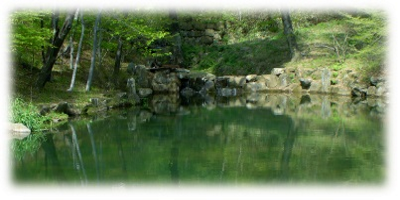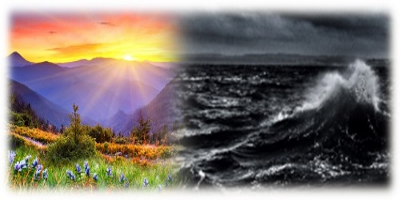In the English language, the noun "pound" has two meanings. The first is something with weight (as in, a "pound of salt") and the second is an enclosure (as in a "dog pound"). Etymology scholars agree that these are two different words from two different sources and this may very well be the case, but there is some very interesting evidence to suggest that there may actually be a connection between the two.
It is assumed that the verb "ponder" is derived out of the word pound (weight), in the sense of giving weight to an idea or thought, "weighing the options," so to speak. However, the word "ponder" is also defined as "reflecting" on an idea or thought. A reflection is what is seen on the surface of water, such as a "reflecting pond." The word "pond" is derived from the word pound (enclosure) in the sense that a pond is enclosed by its banks. In Eastern cultures, ponds are a very common place for meditating (reflecting/pondering).
In the Hebrew language, the idea of "pondering" is also closely related to bodies of water. Psalm 1:2-3 reads, "...He will ponder (meditate) on his teachings day and night, and he will be like a tree planted by a channel of water..." There are several Hebrew words meaning to meditate, one of these is the word si'ahh (שיח, Strong's #7878), which is closely related to the word sahhah (שחה, Strong's #7811) meaning to swim.
The purpose of meditation is to generate strength inside one's self. This strength may be manifested in an emotional or psychological response, such as in creating courage or confidence. The strength may also be revealed in a physical sense such as in creating the ability to stand up to an enemy, trouble or burden.
In addition, water is involved in most of the miracles of the Bible. Creation begins with the Wind of God hovering over the waters (Genesis 1:2). The destruction of all mankind, save Noah, was done with a flood (Genesis 6:17). The infant Moses is saved from Pharaoh's decree to kill all the children by being placed in the river of the Nile (Exodus 2:5). The water in Egypt was turned to blood (Exodus 4:9). Moses' parting of the Red Sea (Exodus 14:21). Moses brought water to the thirsty Israelites by striking the rock (Exodus 17:6). Quail from the sea fed the Israelites (Numbers 11:31). Manna appeared on the ground after the dew dried up (Exodus 16:14). The stopping of the flow of the Jordan River (Joshua 3:13). Elijah drowns his offering with water and it still ignites (1 Kings 18:38). Naaman is healed of leprosy in the Jordan River (2 Kings 5:14). Jonah was saved from drowning in the sea by a fish (Jonah 1:17). Yeshua turns water into wine (John 2:9). The Spirit of God descended from heaven like a dove at the Jordan River (Matthew 3:16). Yeshua walked on water (Matthew 14:26). Yeshua healed a blind man by smearing his eyes with his spit (Mark 8:23). The coin found in a fish from the sea (Matthew 17:27).

Like what you’re discovering? Continue the journey from Bible reader to translator.
|






